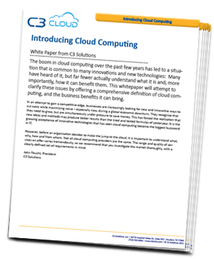 If you’re like most small business owners, you’re probably itching to take advantage of all those wonderful benefits of the cloud you’ve been hearing so much about.
If you’re like most small business owners, you’re probably itching to take advantage of all those wonderful benefits of the cloud you’ve been hearing so much about.
Increased productivity. Cost savings. Scalability.
Don’t have the budget for an IT staff? No problem. Outsource your IT support and services to a hosted IT partner.
While having an IT partner that can take care of all your IT needs with cloud services may sound great, don’t dive headfirst into signing up for cloud services without considering the #1 pushback to using the cloud: what if your internet goes down?
Your Cloud Is Only As Strong As Your Internet Services Provider
I’ve got some tough news for you: the performance of your cloud services is only as strong as the internet connection you get through your Internet Service Provider (ISP). Think about it. When using cloud services, everything you are doing is happening over the Internet. When it comes to hosted services, it’s more that means more than just uploading and downloading files to the cloud. Any time you’re working on the cloud in general (like being signed into a hosted desktop), you can experience slowness and lagginess based on your Internet connection. Many people forget that the public Internet is a physical thing, subject to constraints of how much data you are sending and how far (strangely enough, Ted Stevens’ infamous “series of tubes” analogy is not a horrible way to think about the internet when it comes to cloud service limitations). Even if your IT partner gives you a top-of-the-line dedicated server in their datacenter for hosting all of your files and applications, if your internet connection that links you to their datacenter is some measly, $200/month Comcast budget deal, don’t expect top performance. If you’re using a hosted application or hosted desktop service that requires uninterrupted internet connection (and a decent chunk of bandwidth), going with a budget internet plan could mean that you’re constantly maxing out your bandwidth, causing your connectivity to flicker in and out.
No Internet, No Cloud. No Cloud, No Business
A weak or slow connection is one thing, but a lost connection can bring your business to a standstill. Because the cloud is really just a fancy term for “on the Internet,” if you lose access to the Internet, you lose access to your cloud services. And if you lose access to your cloud services, you lose access to most of the operations that make up the backbone of your business.
For some businesses, such as accounting firm whose employees work mainly out of locally installed QuickBooks, losing internet connection may just be a minor annoyance. But for most businesses, such anyone who hosts their critical programs on their IT partner’s servers, it could disrupt business entirely. For instance, a medical office using a hosted ERP would have no way of looking at patients’ charts, viewing schedules, or sending information.
While you’re making frantic calls to Comcast (which aren’t going to help get your Internet back any sooner), every function of your business is dead in the water.
How to Secure the Connection to Your Cloud
So how can you avoid this nightmare and secure your connection to the cloud? The answer is simple:
Invest in a backup ISP.
Now your primary ISP is still where you should actually be spending your money, because this is where performance matters. 99% of the time, this is the connection you’ll be using, and since it links your computers to your cloud services, this is no place to cut corners.
 A backup should just be the bare minimum you’d need to function for a couple hours if (or, more realistically, when) your primary internet connection goes down, so you don’t need to break the bank. You should be able to get a backup, budget internet connection for about $50 a month - a relatively small investment to ensure you’ll never have to worry about losing your internet connection.
A backup should just be the bare minimum you’d need to function for a couple hours if (or, more realistically, when) your primary internet connection goes down, so you don’t need to break the bank. You should be able to get a backup, budget internet connection for about $50 a month - a relatively small investment to ensure you’ll never have to worry about losing your internet connection.
